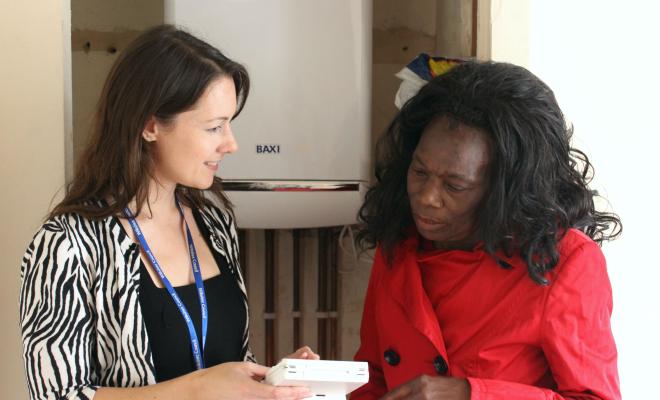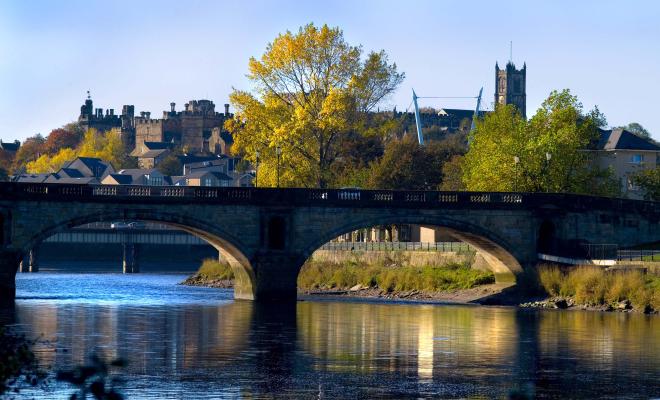Buildings
20 Sep 2024
Wiltshire Council runs a fuel poverty support service and is retrofitting council housing. This case study relates to Actions 11 and 13 of the 50-point Climate Action Plan for Councils. Action 11 includes targeting policies, actions and spending towards people most at risk of fuel poverty, while Action 13 involves retrofitting council-owned properties.
20 Sep 2024
Islington Council has created a joined-up network of services that aim to support vulnerable Londoners facing fuel poverty. This case study relates to Actions 11 and 14 of the 50-point Climate Action Plan for Councils. Action 11 includes identifying people most at risk of fuel poverty and targeting policies, actions and spending towards them, while Action 14 involves helping owner-occupied and fuel-poor homes be more energy efficient, for example via insulation.
20 Sep 2024
Lancaster City Council conducted a prompt review of its Local Plan to ensure the policies it contains will help tackle the climate crisis. Aligning plans, policies and guidance with climate targets forms part of Action 5 in the 50-point Climate Action Plan for Councils.
20 Sep 2024
Discover how Cornwall Council used a simple, locally-tailored tool to check the social and planetary impact of its plans and guide decision-making right across the council. Checking whether council decisions would help or hinder climate action forms part of Action 1 of the 50-point Climate Action Plan for Councils.
20 Sep 2024
Learn how Cotswold District Council appointed climate champions to make more progress on climate goals. Appointing climate champions is Action 2 in the 50-point Climate Action Plan for Councils: identify both a councillor at a cabinet level and a lead officer as Climate and Nature Champions, who are required to publish a twice-yearly independent and audited public report on progress in meeting climate change and nature targets.
20 Sep 2024
Learn how Greater Manchester’s smart energy plan will improve energy performance and lower carbon emissions. This plan forms part of the 50-point Climate Action Plan for Councils under Action 19, to develop a heating and energy efficiency strategy for the area, including providing skills and training to increase local employment to aid recovery from the COVID-19 pandemic.
20 Sep 2024
Learn how Reading Borough Council is using planning to ensure new homes are built to zero-carbon standards. This is part of Action 16 under the 50-point Climate Action Plan for Councils. Through Local Plan policies, councils should require that new housing development is zero carbon by 2025, including the incorporation of renewable energy in the development, using low-carbon materials, and building to extremely high energy-efficient standards (higher than current national standards) using the Passivhaus standard or similar.
20 Sep 2024
Learn how Barnsley's community energy scheme tackled fuel poverty among older people and helped fund neighbourhood projects. Installing local renewable energy sources in council developments and within private and public sector developments is part of Action 32 in the 50-point Climate Action Plan for Councils.
20 Sep 2024
Learn how Hastings Borough Council has partnered with other East Sussex councils to help low-income residents become more energy efficient. Increasing the energy efficiency of homes is Action 14 of the 50-point Climate Action Plan for councils.
20 Sep 2024
Learn how South Gloucestershire Council raised £1.5 million from a housebuilding levy to fund climate infrastructure improvements. Using a housebuilding levy is Action 9 in the 50-point Climate Action Plan for Councils: use legal and planning mechanisms such as Section 106 agreements, the Community Infrastructure Levy, and other mechanisms to fund climate actions and nature restoration projects.
20 Sep 2024
Learn how Liverpool City Council is creating warmer homes, by engaging with landlords and introducing a new 5-year selective licensing designation. This case study relates to Actions 10 and 15 of the 50-point Climate Action Plan for Councils. Action 10 involves implementing private-rented sector licensing to cover the enforcement costs of energy-efficiency compliance, while Action 15 is about rapidly enforcing minimum energy-efficiency standards and encouraging higher EPC levels in the private-rented sector.
20 Sep 2024
North East Derbyshire District Council has upgraded hundreds of hard-to-treat council homes – lowering emissions and tackling fuel poverty. Retrofitting council-owned properties with heat pumps and high levels of insulation where possible is Action 13 in the 50-point Climate Action Plan for Councils.
20 Sep 2024
City of York Council is building 400 zero-carbon homes, using the innovative Passivhaus approach as part of its Climate Action Plan. Zero-carbon homes form part of Action 18 in the 50-point Climate Action Plan for Councils, to require buildings on council land to be extremely energy efficient, using the Passivhaus standard or similar.
These case studies were produced by Ashden and Friends of the Earth, with support from ADEPT (Association of Directors of Environment, Economy, Planning and Transport), Climate Emergency UK, Grantham Institute (Climate Change and the Environment, Imperial College London), London Environment Directors’ Network (LEDNet), and My Society.











